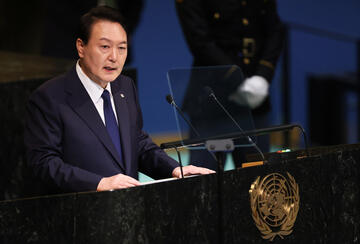
The time has come to depoliticize North Korean human rights. South Korean progressives have argued that working to improve human rights in North Korea threatens to worsen inter-Korean relations and makes addressing security threats difficult, but the Moon administration failed to make progress in security or relations despite sidelining human rights. The Yoon administration should work on multilateral approaches to address the state of human rights in the North and reach a domestic bipartisan consensus on the issue.

Chief Information Officers representing specialties across the Department of Defense met with Michael McFaul, Scott Sagan, and Amy Zegart to discuss the war in Ukraine and how it’s changing the discussion around cyber defense, nuclear policy, and deterrence.
The initial set of results of the Stanford Japan Barometer, a new periodic public opinion survey co-developed by Stanford sociologist Kiyoteru Tsutsui and Dartmouth College political scientist Charles Crabtree, indicate that most Japanese are in favor of recognizing same-sex unions and reveal how framing can influence the public attitude toward LGBTQ communities.
The death of Mahsa Amini in Iran has ignited protests unlike anything seen in the country since the 1970s and might be the spark that finally lights the way for democratic reforms, Dr. Abbas Milani tells Michael McFaul on the World Class Podcast.

Hosted in collaboration with the CSIS Trustee Chair in Chinese Business and Economics, this Big Data China event provided an overview of the latest data-driven research evaluating the influence of China’s party-state on China’s companies and their ability to maintain autonomy.

The vulnerability of critical infrastructure and financial systems to cyber operations remains a primary concern for national security
In this JAMA Health Forum commentary, SHP's Michelle Mello and colleagues argue that the $1.7 trillion omnibus bill that Congress passed in December 2022 responds to several urgent public health needs, yet only narrowly addresses some of the critical determinants of pandemic preparedness.

“When I Get Grown: Reflections of a Freedom Rider,” a film based on Dr. Clayborne Carson's interviews with American civil rights activist Bernard Lafayette, is available to stream for free throughout the month of February.
Stanford e-Japan is made possible by the Yanai Tadashi Foundation.
In opening his annual remarks to the United Nations General Assembly in New York, UN Secretary-General António Guterres emphasized the need for member countries to address the dire international security situation, as described in this year’s Doomsday Clock statement.
Toward Equal Footing
In this Q&A, Stanford Health Policy's Alyce Adams talks about the devastating impact that chronic conditions like diabetes had on her own family members.

Tokyo must make clear at home and abroad that defending Taiwan is no longer off the table.

Stanford alumni, faculty, and industry leaders met in Singapore to promote the exchange of ideas and mutual understanding between the U.S. and Asia
Between 2004 and 2010, Dr. Siegfried Hecker made seven trips to North Korea to explore ways to reduce the danger posed by Pyongyang’s advancing nuclear weapons program.

In this interview, Lee Kong Chian NUS-Stanford Fellow on Southeast Asia Reza Idria discusses his research into Syari’ah Law in Aceh, Indonesia, and the forthcoming book manuscript based on his doctoral dissertation.

The Center on Democracy, Development and the Rule of Law at Stanford University is proud to join a coalition of nearly 500 experts, organizations, dignitaries, and heads of state calling on the international community to strengthen its support for Iranian pro-democracy protesters.

At the Yomiuri International Conference, Freeman Spogli Institute scholars Larry Diamond, Francis Fukuyama, Oriana Skylar Mastro, Michael McFaul, and Kiyoteru Tsutsui examined lessons from the war in Ukraine, the risks of a crisis over Taiwan, and the impacts of both geopolitical flashpoints for defending democracy and for a coordinated approach to deterrence in the Indo-Pacific.
Roz Naylor among new fellows of the American Association for the Advancement of Science.

Predoctoral Fellow Spotlight: Sally Zhang Examines Intrahousehold Economics of Developing Nations
APARC predoctoral fellow and Ph.D. candidate in Economics Sally Zhang reflects on her fellowship experience at the center and explains how her research into income hiding in the household in lower-middle-income countries helps create policies that reduce poverty and promote gender equality.
The second annual Trust & Safety Research Conference, sponsored by the Stanford Internet Observatory, will take place at the Alumni Center at Stanford University
While at Stanford, Elbegdorj, formerly the president of Mongolia, will focus on examining strategies to support Mongolian democracy in an increasingly polarized geopolitical landscape.
Look South
Opportunities for Korea-India Relations

Yoon Suk-yeol’s call to develop nuclear weapons is fundamentally a call for South Korea to know it can protect itself in a changing security environment.
















